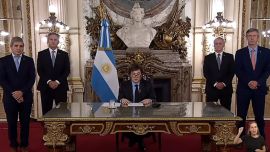Oxford Languages defines populism as “a political approach that strives to appeal to ordinary people who feel their concerns are disregarded by established elite groups,” while Cambridge Dictionary goes with a blunter version: “Political ideas and activities that are intended to get the support of the ordinary people by giving them what they want.” Britannica Encyclopedia adds the subtle touch of noting that populism doesn’t always “champion […] the common person,” sometimes it simply “claims” to.
In a world marked by deep polarisation, it’s interesting to see that populism crosses the ideological divide, like certain economic and political policies. The more one thinks about it, populism is probably the quintessential condition of the modern politician, particularly as societies become more just and balanced, to the point where certain groups cannot simply enforce the most basic elements of their animal will to enslave, incarcerate or directly eliminate those who, in whatever fashion, are different. Populism was a marking feature of both Athenian and Roman society over 4,000 years ago.
It is difficult to imagine how this global Covid-19 pandemic wouldn’t become a breeding ground for political opportunism throughout the world, with governments and oppositions cynically going at it. Of course, in a nation that aspires to “be someone in the world” – despite more than half a century of descent into mediocrity that could become something worse – our relative lack of vaccines has become the battleground for populists to speak to their people. In this “bio-coalition-ism” that Argentine democracy has become, both the ruling Frente de Todos and opposing Juntos por el Cambio enter the electoral arena by using populist messages in order to “win over” the disillusioned closer to the centre.
This week’s fearmonger was Patricia Bullrich, president of the PRO party founded by Mauricio Macri. She claimed the Alberto Fernández administration had failed to secure a deal with Pfizer for tens of millions of vaccines after asking for some sort of “return” (i.e. a bribe or kickback) leading the president to order the attorney he shares with VP Cristina Fernández de Kirchner to initiate legal action for perjury. Bullrich, who generated internal debate in the opposition too, said she had evidence for oft-mentioned yet unproven allegations of corruption, which Pfizer even dismissed. Yet, she finally noted that former health minister Ginés González García was looking to secure a friendly Argentine businessman would serve as the “local partner” in the operation. This is exactly the situation under which the agreement with AstraZeneca was signed, with Hugo Sigman of mAbxience taking on that role, along with a Mexican bottling firm. The deal was partially brokered by Carlos Slim, one of the world’s richest men, and was aimed at supplying Latin America with vaccines.
Even if Bullrich’s claims were partially true (which they may well be), she’s shown throughout the pandemic that her intention is to build a solid base of votes among the hardline supporters of the Macri administration and the historical anti-Peronists. Bullrich has criticised practically every single measure taken by the Fernández-Fernández administration in its battle against Covid-19, from lockdowns to economic policy. Her particular brand of populism is fanned on by Macri, who also relied on antagonism with Mrs. Fernández de Kirchner to win the 2015 and 2017 elections, in part advised by Jaime Durán Barba. Her electoral intentions are clear, as she’s made explicit.
It’s the same strategy that Cristina put in place during her years in power, particularly her second term. True to the populist doctrine, her government was “for the poor,” battling local monopolies supported by the hegemonic powers of the northern hemisphere, particularly the United States. Interestingly, Fernández de Kirchner then picked Alberto as her candidate to beat Macri in 2019, appealing to the moderate voter, to great success. Yet she returns to the “claim” of being “on the people’s side” by pushing populist electoral policies from behind the scenes. These include a cap on utility rate hikes, a disastrously put together tax relief package, a beef export ban, and serious sticks being shoved in the wheel of ongoing negotiations with the International Monetary Fund and the Paris Club. All of these messages are aimed at the hordes of impoverished citizens of the Conurbano or cordons of suburban districts that encircle the City of Buenos Aires, her electoral bastion. All of these will have nefarious consequences in the near future, but they may help her avoid a defeat in upcoming midterm elections. And she probably knows that.
The president has been characterised as an alliance-weaver. Throughout his presidency, he’s been criticised for seeming to always tell everyone what they want to hear, without seeming to worry about flip-flopping later. This week, he told interviewers he will always choose “the people” over “beef exporters,” while claiming Pfizer’s demands were “violent” towards the Argentine people. Despite receiving Peronist support from sectors opposed to Kirchnerism, due to his supposed position as a moderate, he has progressively adopted his vice-president’s agenda of antagonism with the Judiciary and the opposition, and at some point may succumb to her sector’s ideological position in foreign relations. Not having, or expressing, strong convictions, while allowing oneself to be used for a political power project, along with always saying what the other one wants to hear, falls firmly within the realm of populism.
Interestingly, a moderate in the opposition has also fallen prey to populist messages on the back of the pandemic. Buenos Aires City Mayor Horacio Rodríguez Larreta has made the opening of schools his banner in a protracted campaign with the national government that included several attacks on the federal capital’s constitutional autonomy. Rodríguez Larreta didn’t have it easy, forced to negotiate with Buenos Aires Province Governor Axel Kicillof and his aggressive crew, yet he chose the path of confrontation in the early stages of the second wave, helping to fuel disillusionment as people were once again locked down. A skilled politician, Rodríguez Larreta used the courts to his favour to win a political victory that was not much more than that, as schools were eventually closed down again in the City of Buenos Aires as cases spiralled out of control. The showdown will begin again shortly, with kids, parents and teachers caught in the tug-of-war. Once again, playing for the crowd.
Unfortunately, it seems our style of society and democracy breeds populism and polarisation, with politicians quickly picking up on the electoral victories of their adversaries. In the United States, a usually moderate Joe Biden has now asked his intelligence agencies to investigate the possible leak of Covid-19 from a laboratory in Wuhan, while he’s kept China as his country’s main opponent in the geopolitical stage, taking a page out of Donald Trump’s book. He’s following in the footsteps of Vladimir Putin and Xi Jinping by engaging in vaccine diplomacy, giving countries “what they want” in exchange for some level of allegiance.
Populism is cynical. Promises are made in exchange for a specific outcome, and not because they are fair or just. Taken to the extreme, this deepens polarisation. And we know that all too well.























Comments